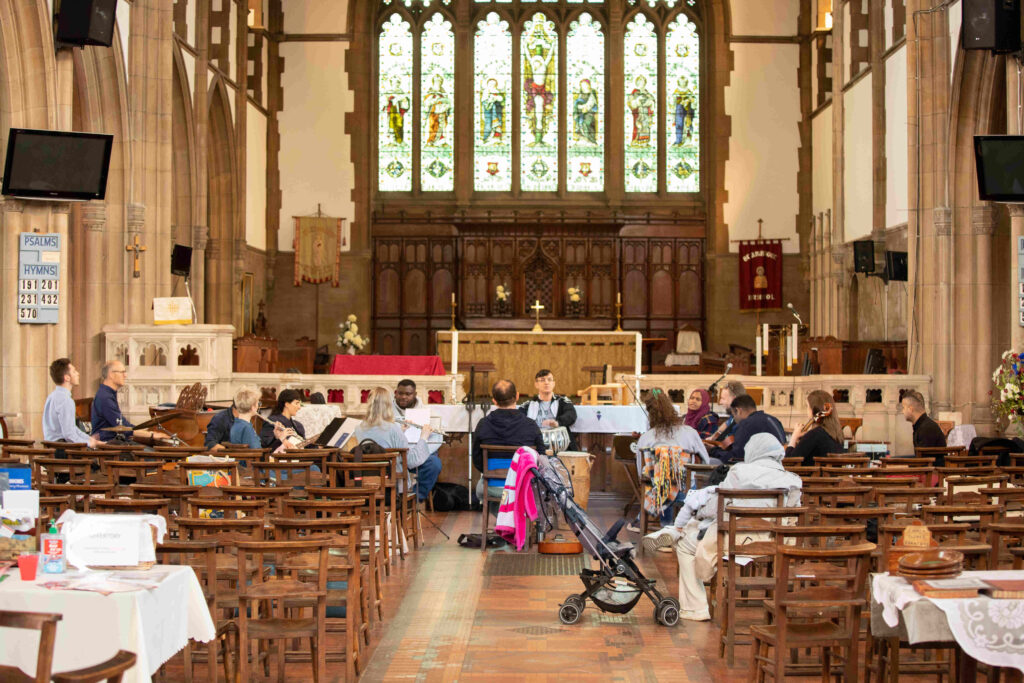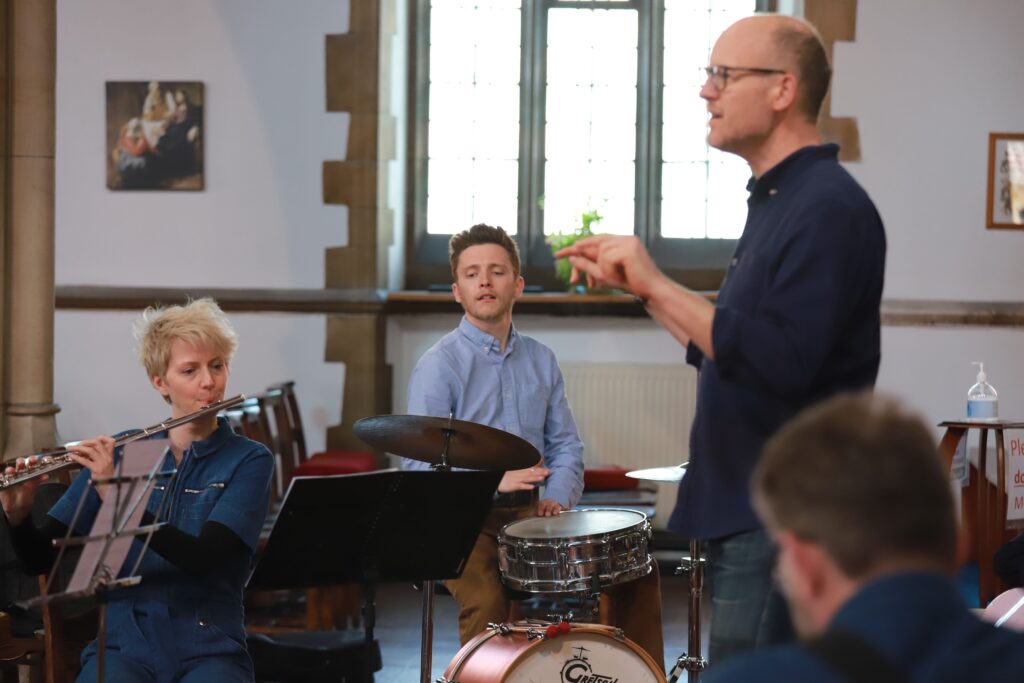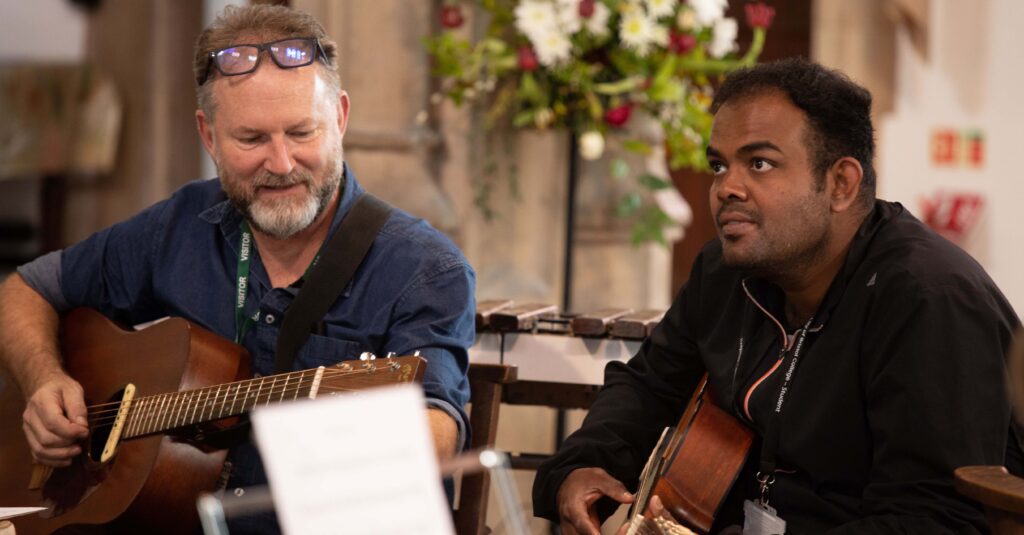From the moment he walked in through the heavy wood doors, Oba’s* warmth and laughter brought life to the previously cold, empty church. Aided by two crutches after contracting polio aged five, the now 28-year-old excitedly makes his way over to an old black and white bass snuggled beside a piano, eager to get going.
An assortment of djembes and guitars are gathered in the centre of a circle, complete with a tabla (an Indian drum) and harmonium. Oba sets his crutches down and wrestles the bass strap around himself, laughing with the Afghan tabla player beside him. Together they communicate through simple gestures and welcoming smiles. English isn’t necessary here.
Oba is one of 50 to 60 musicians who have made their way through the doors of St. Ambrose Church, Bristol, using music to escape the limbo of impending asylum applications and connect with friends over a chocolate traybake and a hot cup of tea. “It’s a way of living, to forget what is going on,” says Oba, who came to the UK 13 months ago from Nigeria. “When you are being detained, it’s like a prison. We are human, we have the same colour blood running in our veins.”
Piloted in September 2022, Dovetail is an orchestra for asylum seekers and refugees, known within the group as ‘neighbour musicians’. Together they learn how to make music across different styles with many, like Oba, using it as an opportunity to learn a new instrument for the first time.
We create a sense of community beyond the music
Oba, neighbour musician
Founder and workshop leader Jonathan James wanted to start the group after seeing the benefits weekly music rehearsal had on those affected by problematic drug or alcohol use, through his last project the Recovery Orchestra. “I’ve always been interested in the asylum seeker question: how best can we welcome people and work with people, constructively, once they’re in our city.”
Oba came to the UK facing economic pressures against a backdrop of unimaginable danger. “I don’t know if you’ve heard about Muhammadu Buhari and his insurgency,” he asks. “But there are kidnappers everywhere, killings everywhere. You cannot walk around freely without being afraid.”
Oba talks about the time he was left shaken after taking the 18-minute trip from Benin City to Abu to collect his UK visa. “I was really scared because the driver drove past the place where he himself was kidnapped with some five or seven persons. He told me he’d escaped while they shot at the rest. For that reason, many people, especially drivers, have a sword under their seat for self-defence.”
In 2022, the Corruption Perceptions Index rated Nigeria the 24th most corrupt country in the world. For Oba, being physically challenged made it difficult for him to maintain independence and earn a living. “The best way is through sport,” he says. “As a physically challenged person, you have no choice but to accept [a career in sport] because you are human, you have to eat, you need to take care of yourself,”


Although Oba had a career as a powerlifter, specialising in bench, he was often at the mercy of those who trained him. Stifling cuts and mistreatment at the hands of his trainer became too much and Oba felt his only real option was to leave. Over a year later, he is one of the 138,052 asylum seekers waiting for an initial decision on their application and one of the 49,606 currently living in a hotel.
Bristol, where Oba has been placed, was granted sanctuary status in 2011. As a result, the city has built a large network of 15 charities that work together to provide support and activities for asylum seekers.
As a part of this partnership, Dovetail is not only able to provide a musical haven for their neighbour musicians but also direct help with whatever they may need assistance with. “We create a sense of community beyond the music,” James explains. “I was just looking at emergency accommodation a neighbour musician and his family had been pulled into after they were asked to leave their current place. It’s got mice, and it’s inappropriate for the kids. The kids are so scared that they’re not going to school.”
Read: ‘Diversity drives excellence’: The fight for fair music education
Read more from our global voices here
While in this case he acted as an advocate for the family with the council, James feels it’s good to have the support of charities designed to help in these situations. “I’m comfortable with the fact that we have this clear role to provide music at the most professional level we can. Between the other 15 charities, there are lots of specialists who can be involved on the trauma side of things.”
For Oba, coming to Dovetail every Tuesday afternoon gives him a sense of control in his asylum limbo. “It’s difficult because I’m not allowed to work and I’m an independent person,” he says. “I enjoy [Dovetail] because there’s no music I don’t listen to. At times I listen to songs that I don’t know what it means but I enjoy the vibes. I want to dance!”
It’s a feeling that connects both the professional and neighbour musicians. “Music has a means of opening dimensions for people to relate to each other,” says James. “You don’t have to put words to it, you just kind of get it.”
We’re trying to provide an opportunity for people to relive elements of their past, to have a deep musical connection to their family and culture
Jonathan James, Dovetail founder
With its first concert on the horizon, Dovetail is rehearsing repertoire from all corners of the world including Bangladesh, Turkey and Afghanistan, all chosen by the neighbour musicians. “We’re trying to provide an opportunity for people to relive elements of their past, to have a deep musical connection to their family and culture,” says James.
First, the group invites a neighbour musician to sing or play their song, then a small group of professionals led by James on the piano establish a chord progression and bass line, before harmonising the melody. Crucially, the team also knows when to step back and let the melody speak for itself. In one rehearsal, a mother from Bangladesh accompanied by her sister and toddler, begins to sing. A prayer-like lullaby cascades through the church as if time is suspended. As her chant fades, laughter erupts shattering the silence as everyone’s forgotten to come in, entranced by her song. “Their chant is coming from a deeply spiritual place, you know,” says James. “That level of self-expression goes deep. It’s a beautiful thing.”
As Dovetail looks towards its first anniversary, James hopes the project will grow and expand outside of Bristol. However, in this small corner of the city, this patchwork orchestra has become a haven for those it supports, allowing them to feel human again. “Dovetail is a way of me expressing my anxiety out, my depression out,” Oba says. “My hotel manager asked me the other day, ‘How do you manage to cope? You are always happy’. I told him, ‘I choose it’. I know it’s not my way, it’s not in my power, but I can’t just sit there and think about it.”
*Oba’s name has been changed to protect his identity
Read: Bringing music to the frontline
Read more from our global voices here

